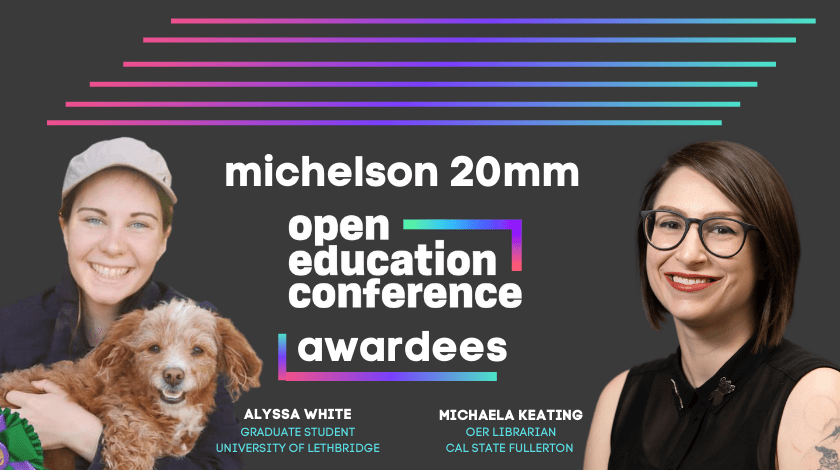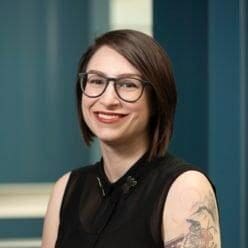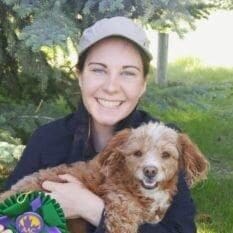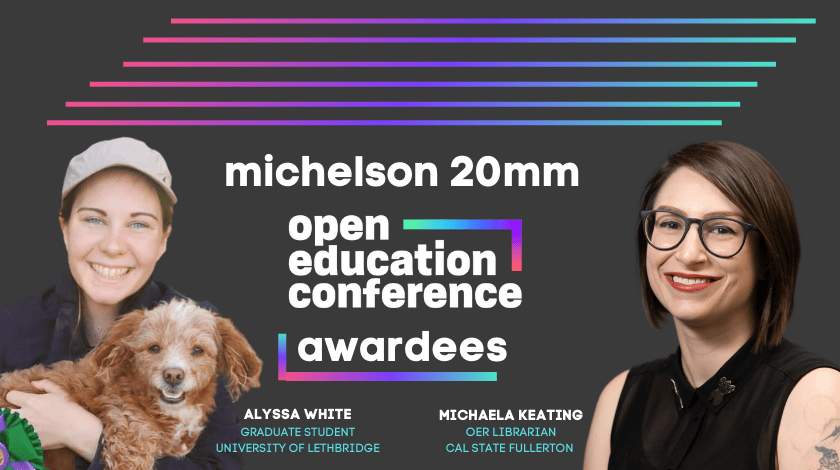The Open Education Conference saw experts from around the world explore learning resources across the educational sphere.

During the recent Open Education Conference, the Michelson 20MM Foundation and the awardees of our attendance scholarship program had the opportunity to hear from experts from around the world and meet others implementing open educational resources across the educational sphere. Over the next several weeks, we will share reflections from our scholarship recipients on their experiences at this year’s OpenEd Conference. Today, we are featuring Michaela Keating and Alyssa White.
This article was originally published on 20mm.org.
Making the Case for Accurate Course Marking

Michaela Keating, 2021 Open Ed Awardee
When I started looking into the sessions offered in the OpenEd Conference, I was relieved to see there were many presentations about course marking and desperately hoped one of them would have a solution to a years-long problem at my institution. Course marking is where colleges and universities specify which class sections have zero materials cost in their course catalogs so that students can make informed choices during enrollment. While it seems like it should be a straightforward process, the reality is more complicated.
Since I started my role as Open Educational Resources Librarian at California State University, Fullerton, marking zero-cost courses has been a consistent problem I’ve been unable to solve. Under California’s law SB-1359, higher education institutions are required to clearly communicate to students if courses have no material costs, which seemed like it should be clear and easy. Each semester, my colleagues and I try new ways of reaching out to faculty, the campus bookstore, department chairs, and deans in an attempt to accurately reflect the zero-cost courses in the course catalog. Yet, at the end of every semester, I find myself baffled and frustrated to discover that we still have not managed to compile a complete list for our students; thus, we begin the cycle again of trying to peer into the black box and figure out what we are doing wrong.
“Attending these sessions renewed my drive to try to solve this problem, but this time not only within the silo of my own institution. ” — Michaela Keating
While I did not find the ‘deus ex machina’ I was hoping for, many of the OpenEd Conference presentations showed me that this is not a stand-alone problem at my institution, which was a true epiphany! None of us are doing any one thing wrong that is disrupting the process; rather, it’s the convoluted systems and competing campus interests that make this a persistent problem. While it was a relief to find that I am not carrying this burden alone, I’m frustrated to find there are such significant and systemic problems with making this information available to students.
Attending these sessions renewed my drive to try to solve this problem, but this time not only within the silo of my own institution. While there is great work being done to help institutions develop definitions and set policies for course reporting, there are limited resources available for dealing with persistent non-compliance. This needs to be a priority for everyone from individual professors and librarians to university chancellors, because without correct labeling, all the work that faculty, librarians, instructional designers and others do to make courses more equitable and affordable will go unseen by those who need the information the most.
I hope that others will join me in finding ways to tackle this issue, and I think a good place to start is with understanding more about the current barriers to reporting, especially in states like California where the law requires clear communication. The Open Education community is filled with passionate and innovative people, the solution to this problem will come from working together among our colleagues.
– Michaela Keating is the OER librarian at California State University Fullerton
Empowering Students Is Critical

Alyssa White, 2021 Open Ed Awardee
As someone new to academic conferences, I was a bit unsure what to expect from the OpenEd Conference. I have only begun engaging with open educational practices within the past year, and most of my work has been centered around independent research with a single faculty member, so it was incredible to see how expansive and passionate the community is. I attended the OpenEd Conference with the goal of expanding my knowledge on how open educational practices were being applied all over the world, and I was very happy to see a variety of topics, positions, and locations represented.
There were sessions available on everything from building communities of practice for OER production to how open pedagogical practices were received by students to the importance of decolonization and diversifying class materials, which are all areas that are important to my research. As a student, I also appreciated the emphasis on student involvement and the importance of community collaboration in open education, both of which drew me to the use of open educational resources (OERs) and open pedagogy in higher education. It was especially exciting to see sessions that both reflected student experiences with OERs and open pedagogy in classrooms and centered students’ work on and with OERs, as they are often critical participants in this work. Attending this conference has provided incredible insights into the possibilities of open education, which I am thrilled to bring back to my own campus to help increase awareness around this topic.
The potential of students and the importance of the knowledge they generate during their postsecondary education drives my focus on open education. Students, especially as undergraduates, are often positioned as retainers of knowledge instead of legitimate producers of it, which is something I experienced through most of my undergraduate degree. Traditional assignments and tests taught me to hold onto and rehearse information when it was needed for a class, only to discard it once the information was no longer relevant. Knowledge often became as disposable as the assignments I applied it to.
“The OpenEd Conference reinforced for me that when we empower students to embrace creativity and agency in their own education through open pedagogical practices and encourage them to consider how their work can impact others, anything is possible!” — Alyssa White
During my undergraduate senior year, the pattern of learning shifted for me. Faculty within the anthropology department at my university began to explore the use of OERs in introductory classes. Their objective was to lessen the financial constraints of students who were located all over the world due to remote learning and they wanted to learn more about its other possibilities. I was brought onto this project as a student researcher and was able to take on an entirely different position than I was used to as a collaborator. This was an area with which both myself and my supervisor were unfamiliar; rather than assignments such as research papers, I used my research to create a collection of resources that could be used to educate other faculty on campus about both OERs and open pedagogy. My supervisor and I learned alongside each other, with her acting as a guide to my research rather than a determiner of it.
Since I was working as a partner and knew my work would be used beyond the end of the study, I found the approach to this research dramatically different from past work. I exercised more creativity in my research, which increased my commitment to and interest in the work that I was doing. Engaging with open pedagogical practices showed that knowledge is not short-term—the research can impact the way other students conceptualize their own learning. This increased engagement has yet to diminish. I am now pursuing this topic in graduate school, and am in the process of building an OER in collaboration with my supervisor with the goal of introducing other students to the experience of being knowledge producers themselves through open pedagogy.
An incredible example of the type of powerful work students at all levels in postsecondary are capable of was shared during the plenary “Students at the Center”, which highlighted the importance of ensuring students remain the focus of higher ed. It was very inspiring to see how much other students have accomplished, and has motivated me to remember that my own work can have just as much of an impact. More than anything, the OpenEd Conference reinforced for me that when we empower students to embrace creativity and agency in their own education through open pedagogical practices and encourage them to consider how their work can impact others, anything is possible!
– Alyssa White is a first year master’s student at University of Lethbridge in Alberta, Canada, studying anthropology.
Michelson 20MM is a private, nonprofit foundation seeking to accelerate progress towards a more just world through grantmaking, operating programs, and impact investing. Co-chaired and funded by Alya and Gary Michelson, Michelson 20MM is part of the Michelson Philanthropies network of foundations.

